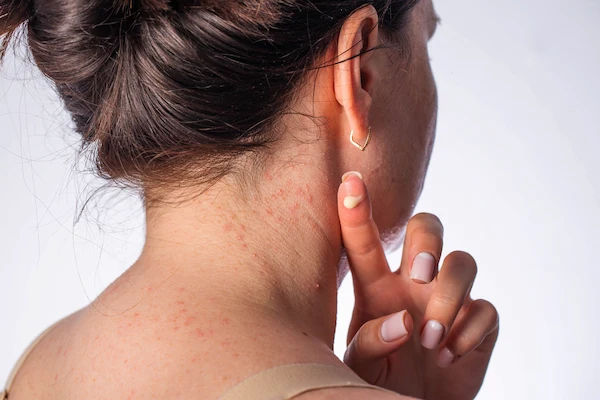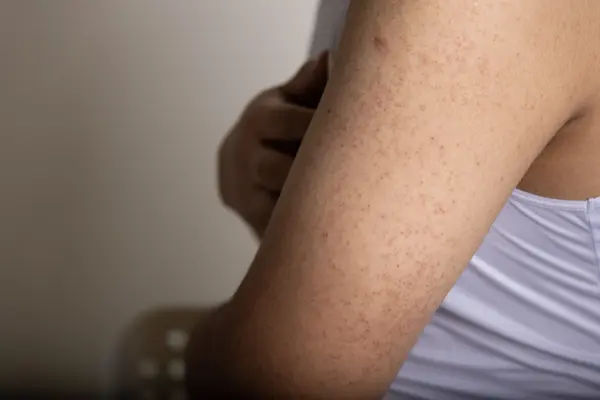How To Reduce Underarm Smell: Hygiene Practices and Remedies
Discover the best ways to reduce underarm smell with effective hygiene practices, dietary changes, natural remedies, and medical treatments. Learn about the lifestyle changes that can help control body odour.

Written by
Last updated on 13th Jan, 2026
Most people face daily challenges with unpleasant underarm odour. This usually happens when proteins present in the sweat are broken down by bacteria, resulting in an unpleasant smell. The leading causes of underarm odour include improper hygiene, diet and hormonal shifts, and specific health conditions.
This guide examines ways to control underarm odour by using natural products, medical solutions, and lifestyle modifications.
Best Hygiene Practices to Reduce Underarm Smell
Managing underarm odour effectively requires consistent and proper hygiene practices. Sweat itself is odourless, but when it interacts with bacteria on the skin, it produces an unpleasant smell. Implementing the following hygiene habits can significantly reduce underarm odour:
Use Antibacterial Soap: Washing underarms with antibacterial soap helps remove sweat, bacteria, and dead skin cells that contribute to odour. Choose soaps with ingredients like tea tree oil, neem, or benzoyl peroxide for extra antibacterial benefits.
Double Cleansing Method: If underarm odour is persistent, consider cleansing twice—first with an antibacterial soap to kill bacteria, followed by a mild pH-balanced cleanser to maintain skin health.
Thorough Drying After Showering: Bacteria thrive in moist environments, so it’s essential to dry underarms completely before dressing. Use a clean towel or even a blow dryer on a cool setting to ensure dryness.
Exfoliate Weekly: Dead skin cells trap sweat and bacteria, leading to odour. Gently exfoliate underarms once or twice a week using a mild scrub or a chemical exfoliant like glycolic acid or salicylic acid to keep the skin fresh and clean.
Apply Antiperspirants & Deodorants Correctly:
Antiperspirants block sweat production by temporarily closing sweat glands, reducing the moisture that bacteria feed on.
Deodorants don’t stop sweating but contain antibacterial agents that neutralise odour.
Apply these products to clean, dry skin before bedtime, as sweat gland activity slows down at night, allowing better absorption.
Shave or Trim Underarm Hair: Hair can trap sweat and bacteria, making odour worse. Regular shaving or trimming helps keep the area cleaner and allows antiperspirants to work more effectively.
Use Underarm Wipes: If you sweat a lot during the day, carrying antibacterial underarm wipes can help cleanse the area and reduce odour buildup between showers.
Wear Clean, Breathable Clothing: Tight, synthetic fabrics can trap heat and moisture, worsening odour. Opt for breathable, moisture-wicking fabrics like cotton, linen, or bamboo to allow airflow and keep underarms dry.
By following these hygiene practices, individuals can effectively manage underarm odour and feel fresher throughout the day.
Diet and Nutrition Tips to Reduce Underarm Odour
Meal choices significantly impact one’s body aroma. This is because particular substances break down into stronger-smelling compounds when they pass through sweat. In this regard, individuals can follow some tips such as:
Limit the consumption of sulfur-heavy foods, including garlic, onions, and cruciferous vegetables, as they aggravate body odour from sweating.
Reduce the intake of red meat, junk food, and caffeine. They make the body sweat more, which results in a strong underarm odour.
Limit alcohol intake as it can work together with dehydration to increase perspiration and aggravate underarm odour.
Changing the diet strategically will naturally minimise the smell of one’s underarms:
Consume chlorophyll-rich leafy greens to counteract underarm odour naturally.
Add citrus fruits to the diet. Their vitamin C content aids in removing toxic substances from the body, while the high fibre content creates a healthy environment for digestion and effectively eliminates toxins.
Drink enough water to help dilute sweat compounds and make underarm odours less intense.
Natural Remedies to Combat Underarm Smell
Consider following the natural remedies listed below to reduce underarm odour:
Green tea, lemon juice, and baking soda are household items that work to eliminate bacteria while maintaining proper skin pH levels.
The tannins in green tea minimise sweating, and baking soda absorbs odours through its absorbent properties.
Apple cider vinegar and turmeric have antibacterial strengths that make them essential components in natural hygiene practices as long as individuals use proper dilution methods.
Essential oils are one effective strategy to address body odour using natural methods.
Tea tree oil's antimicrobial strength works best when applied diluted with a carrier oil, and lavender oil provides antibacterial protection with pleasing aromas.
Different essential oil blends, such as peppermint and lemon, together with eucalyptus, provide fresh scents while simultaneously fighting bacteria that cause odour.
To prevent skin irritation, users should properly dilute essential oils and test small quantities on their skin before regular use.
Clothing and Fabrics to Reduce Armpit Smell
Fabric choice functions as an essential element in dealing with underarm body odour:
The sweat-absorbing properties of natural breathable materials such as cotton, linen, and bamboo create ventilation that prevents odours from forming.
Merino wool distinguishes itself through its antimicrobial features, and modern performance materials function well for activewear because they effectively remove sweat from the skin surface.
Proper underarm odour prevention depends on selecting clothes that guarantee ventilation and moisture control.
The success of preventing odours depends equally on the correct care of clothing. Garments must be washed regularly, particularly those that rest in zones with high sweat levels.
Flipping clothes inside out before laundering provides superior results in cleaning sweaty and bacterially contaminated regions.
Adding baking soda or vinegar during laundry cycles effectively reduces odours, yet prolonged exposure to foam softeners causes odour-trapping residue to accumulate.
Drying clothes outdoors supports odour prevention by removing bacteria and excess moisture from garments.
Medical Treatments and Products for Reducing Underarm Odour
Over-the-counter products successfully help manage body odour through their effective treatment methods:
Regular-strength antiperspirants stop sweat glands using aluminium compounds, whereas deodorants fight bacteria with alcohol solutions.
To achieve better results, using antibacterial soaps and cleansers with benzoyl peroxide is helpful, as it minimises bacterial growth on the skin surface.
Regularly using these treatments in daily hygiene practice helps control mild to moderate body odour conditions effectively.
People should visit a dermatologist if their body odour issues remain uncontrolled with over-the-counter products or if their body odour patterns start exhibiting concerning changes.
Medical professionals can provide prescription-strength antiperspirants, topical antibiotics, and Botulinum toxin injections as necessary treatments for patients with severe hyperhidrosis.
Individuals must seek professional medical care when their body odour changes suddenly, they sweat excessively, or their condition causes significant deterioration in their quality of life. This might indicate health problems that need expert evaluation.
Lifestyle Changes for Reducing Underarm Odour
Effective stress management controls body odour because it decreases sweat output from stress:
Performing deep breathing exercises alongside meditation and practising yoga effectively regulates sweating that occurs due to anxiety.
Exercise proves effective as a stress management tool, although one must shower immediately after exercising to prevent sweat accumulation in their skin.
Reducing caffeine consumption and listening to peaceful tunes helps individuals manage their stress better, which decreases sweating.
Body odour control requires proper hydration as a core element of successful management.
Water supports bodily toxin removal by enabling efficient sweating, preventing bacteria from growing and forming undesirable odours.
Body dehydration hampers toxin removal processes, resulting in stronger and more severe odours, which concentrate in the underarm area, feet, and groin region.
Daily water consumption at recommended levels benefits overall health and plays an essential role in eliminating toxins and managing natural odours.
Conclusion
The holistic process of controlling underarm odour requires diligent personal care, dietary adjustments, natural remedies, the right choice of clothes, suitable treatments, and lifestyle improvements.
Fundamental knowledge of bodily odour origins combined with comprehensive intervention methods enables people to effectively control odours while boosting their self-confidence and preserving their freshness.
Consult Top General Physicians
Consult Top General Physicians

Dr. Vivek D
General Physician
4 Years • MBBS
Bengaluru
PRESTIGE SHANTHINIKETAN - SOCIETY CLINIC, Bengaluru

Dr Syed Mateen Pasha
General Physician
2 Years • MBBS
Bengaluru
PRESTIGE SHANTHINIKETAN - SOCIETY CLINIC, Bengaluru

Dr. Syed Ismail Ali
General Practitioner
7 Years • MBBS
Hyderabad
Apollo 24|7 Clinic, Hyderabad

Dr. Harshendra Jaiswal
General Physician/ Internal Medicine Specialist
12 Years • MBBS , MD (General medicine)
Kolkata
108 DHANA DHANVANTARI Clinic, Kolkata
(25+ Patients)
Dr. Thandra Ramoji Babu
General Physician/ Internal Medicine Specialist
5 Years • MBBS, DNB(General Medicine)
Warangal
Sai Ram multi-specialty hospital, Warangal


